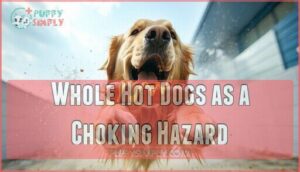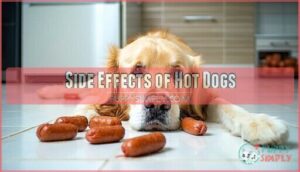This site is supported by our readers. We may earn a commission, at no cost to you, if you purchase through links.
 Yes, dogs can eat hot dogs, but it’s not the healthiest choice.
Yes, dogs can eat hot dogs, but it’s not the healthiest choice.
Most hot dogs are packed with salt, preservatives, and spices that can upset your pup’s stomach or even lead to long-term issues like pancreatitis.
A small bite as a rare treat might be fine, but feeding a whole hot dog can cause problems, especially for smaller breeds.
Always check the ingredients—avoid onion, garlic, or excessive seasoning.
And remember, their high-fat content makes them a calorie bomb for your dog.
If you want safer treat ideas or healthier options to spoil your four-legged friend, there’s a world beyond hot dogs!
Table Of Contents
- Key Takeaways
- Can Dogs Eat Hot Dogs?
- Check The Ingredients
- What Are The Best Hot Dogs?
- Whole Hot Dogs as a Choking Hazard
- Side Effects of Hot Dogs
- Puppies and Hot Dogs
- Hot Dogs as Treats
- Alternative Treats for Dogs
- Hot Dogs as a Daily Meal
- If Your Dog Eats a Hot Dog
- Frequently Asked Questions (FAQs)
- Should I let my dog eat hot dogs?
- Are hot dogs bad for dogs?
- What happens if my dog eats a whole hot dog?
- Are there any healthy alternatives to hot dogs?
- What is the recommended daily amount of hot dogs for dogs?
- Are all brands of hot dogs unhealthy for dogs?
- How can I tell if my dog has eaten a hot dog?
- Is it safe to give my puppy hot dogs?
- Are plant-based hot dogs safe for dogs?
- Do hot dogs affect dogs with heart conditions?
- Conclusion
Key Takeaways
- Hot dogs aren’t ideal for dogs due to high fat, sodium, and harmful additives like garlic or onion powder, which can be toxic.
- A small bite as a rare treat is fine, but feeding a whole hot dog can lead to digestion issues, dehydration, or weight gain.
- Always check the ingredients for toxic substances and avoid hot dogs with preservatives, artificial sweeteners, or excessive salt.
- Healthier alternatives include plain, cooked chicken, turkey, or safe fruits and veggies like carrots or apple slices.
Can Dogs Eat Hot Dogs?
Can dogs eat hot dogs? While they might seem like a tempting snack, hot dogs aren’t a great choice for your furry friend.
Loaded with fat, calories, and questionable hot dog ingredients, they pose health risks like sodium nitrate risks and MSG concerns.
Toxic seasonings, such as garlic powder, can spell trouble for dogs.
Even “safe hot dogs” or plant-based versions often lack proper nutrition. If you’re wondering about hot dog risks for dogs, it’s generally smarter to avoid them altogether.
Check The Ingredients
Not all hot dogs are created equal, and checking the ingredients is a must before sharing a bite with your dog.
Some hot dog ingredients, like garlic or onion powder, can be toxic, putting your dog’s health at risk.
Sodium nitrate and MSG concerns are also worth noting, as these additives have been linked to serious health issues.
Artificial sweeteners, especially xylitol, are another danger, even in small amounts.
High sodium and fat levels might make hot dogs tasty, but they’re no friend to your pup’s stomach.
Stick to options with safe ingredients, and always avoid ones with toxic additives.
Reading the label carefully helps you steer clear of hot dog toxicity and minimize hot dog risks for dogs.
What Are The Best Hot Dogs?
When choosing hot dogs for dogs, prioritize brands with the healthiest, most dog-friendly ingredients.
Look for options low in sodium, free from allergens like garlic or onions, and minimally processed.
While traditional options aren’t perfect, there are better picks for occasional treats:
- Nathan’s Famous Skinless Beef Franks: Classic flavor but high in sodium, so use sparingly.
- 365 Organic Uncured Grass-Fed Beef Hot Dogs: Organic and preservative-free, though a bit bland.
- Hebrew National Beef Franks: Juicy and Kosher-certified but very salty.
If you’re leaning toward healthy hot dog alternatives for dogs, consider plain, lean meats like grilled chicken sausages or turkey.
These options offer fewer preservatives and more natural nutrition, making them safer choices for your furry friend.
Always serve in moderation!
You can find options for best hotdog brands to examine.
Whole Hot Dogs as a Choking Hazard
Size matters in the context of feeding hot dogs to dogs—they’re a choking hazard if swallowed whole, especially for larger breeds.
A dog’s swallowing reflex can make it hard to chew these slippery snacks properly. Prevention tips? Always cut hot dogs into bite-sized pieces to reduce risks.
Breed predisposition plays a role, too—some dogs are natural gulpers! If your dog chokes, act fast with emergency actions like the Heimlich maneuver.
One must be aware of potential choking hazards to keep dogs safe. Wondering, “Are hot dogs safe?” Small portions, cut up, are safer options.
Side Effects of Hot Dogs
Feeding your dog hot dogs might seem harmless, but it can lead to some unpleasant side effects.
Hot dogs may seem harmless, but their high fat and additives can lead to serious health risks for dogs.
From an upset stomach to more serious issues like pancreatitis, it’s important to know the risks before sharing this snack.
High-Fat Content
A hot dog’s high-fat content isn’t just unhealthy—it’s a ticket to potential pancreatitis risk, weight gain, liver issues, and gallbladder problems for your furry friend.
These processed snacks are packed with unhealthy fats and salt, making them a poor choice for canine nutrition. Over time, regular exposure to such foods can spell calorie overload and trigger a cascade of dog health risks.
For a healthier dog diet, try:
- Leaner protein options like plain, cooked chicken breast or fish.
- Skipping seasonings entirely to avoid unnecessary additives.
- Avoiding highly processed meats like deli slices, which often hide unhealthy extras.
- Ensuring plenty of fresh water to support their overall digestion and health.
Stick to nutrient-rich choices for your pup’s lasting well-being.
Calorie Content
Your dog doesn’t need the calorie density packed into hot dogs.
With 150-200 calories per sausage, they’re a fast track to dog obesity, especially for smaller pups or less active breeds.
Beyond calorie content, fatty foods like these strain your dog’s diet, increasing risks of dehydration, high blood pressure, and digestive upset.
Stick to portion sizes that make sense for your dog’s weight management goals.
Instead, consider cooked chicken or fish fillets—low-calorie alternatives that keep tails wagging without the hot dog risks.
Puppies and Hot Dogs
Puppies have sensitive tummies, and feeding them hot dogs can upset their digestion.
The high fat, sodium, and harmful additives, like garlic or onion powder, can disrupt puppy nutrition and even impact their growth.
Even in safe amounts, hot dogs aren’t ideal due to their poor nutritional balance and potential dehydration risks.
Instead, choose lean, unseasoned meats like chicken or turkey that match your pup’s dietary restrictions.
Remember, for training aid purposes, stick to tiny dog treat sizes suitable for their age, and prioritize lean meats to support their health, avoiding harmful ingredients like garlic or onion powder.
Hot Dogs as Treats
While hot dogs can be tempting as training treats, they’re not ideal for dogs.
With high salt, fat, and additives, they pose risks like dehydration and weight gain.
If you’re wondering, “Can dogs eat hot dogs occasionally?” here’s how to stay cautious:
- Use plain, cooked pieces sparingly following moderation guidelines.
- Avoid any with garlic, onion, or harmful additives.
- As a pill concealer, opt for safer alternatives first.
- Always factor in the calorie consideration for your pup’s diet.
Alternative Treats for Dogs
Instead of hot dogs, try healthier options like lean, plain chicken or beef for protein, safe veggies like carrots or green beans, or invigorating fruit options such as apples or blueberries.
Homemade treats, like frozen banana chunks or boiled chicken bites, are cost-effective and easy to make.
For convenience, there are commercial alternatives like Greenies or kibble-based snacks, offering dog-friendly nutrition.
Remember, dog treat alternatives should be simple, free of harmful additives, and balanced, ensuring your pup enjoys healthy dog treats worry-free!
Hot Dogs as a Daily Meal
Feeding your dog hot dogs daily might seem harmless, but it’s a recipe for trouble.
With high sodium, preservatives, and questionable meat quality, hot dog nutrition for dogs falls short.
Long-term effects, such as obesity risks, organ damage, and dietary imbalances, are real concerns.
These snacks can also lead to digestive upset, dehydration, or nutritional deficiencies over time.
While an occasional bite won’t hurt, regular consumption could negatively affect your dog’s health.
Prioritize natural, nutrient-rich options for a better dog diet, and be aware of the potential for digestive upset.
If Your Dog Eats a Hot Dog
If your dog sneaks a hot dog, don’t panic—but don’t ignore it either.
Stay calm if your dog eats a hot dog—check ingredients, offer water, and monitor for any signs of digestive trouble.
Start by checking the ingredients on the package. Look for anything toxic, like garlic, onion powder, or artificial sweeteners, which can cause serious issues like toxin exposure or allergic reactions.
Next, monitor symptoms closely. Watch for signs like vomiting, diarrhea, or lethargy. High salt and fat in hot dogs can upset your dog’s stomach or lead to dehydration, so make certain they’ve plenty of fresh water.
Here’s what to keep in mind:
- Hydration Importance: Offer water to counteract high sodium.
- Watch for Digestive Troubles: Look out for vomiting, diarrhea, or cramping.
- Know When to Seek Help: Contact a vet if symptoms worsen.
A one-time snack isn’t usually dangerous, but keeping an eye on your dog’s health makes all the difference!
Frequently Asked Questions (FAQs)
Should I let my dog eat hot dogs?
A single hot dog can pack up to 300 calories, quickly adding to your dog’s daily limit.
While they’re not toxic, their fat, sodium, and additives aren’t ideal.
Save them for rare treats, if ever.
Are hot dogs bad for dogs?
Hot dogs aren’t the best choice for dogs.
They’re high in fat, sodium, and unhealthy additives like garlic or onion powder, which are toxic.
While an occasional bite might be fine, regular feeding poses health risks.
What happens if my dog eats a whole hot dog?
If your dog gobbles a whole hot dog, keep an eye out for vomiting, diarrhea, or choking.
The high salt and fat might upset their stomach, so make certain they’ve water and monitor symptoms.
Are there any healthy alternatives to hot dogs?
Imagine swapping junk food for a nutritious snack—your dog deserves the same.
Try cooked, unseasoned chicken or turkey, small carrot pieces, or apple slices (sans seeds).
They’re healthier, safer, and still super satisfying!
What is the recommended daily amount of hot dogs for dogs?
You should limit hot dog treats to one or two small bites occasionally.
A ¼-inch slice per 15 pounds of your dog’s weight is plenty.
Remember, hot dogs aren’t a healthy option for regular feeding.
Are all brands of hot dogs unhealthy for dogs?
Not every hot dog brand is made equal, but most are still unhealthy for dogs.
Loaded with fat, sodium, and sometimes harmful additives like garlic powder, they’re not worth the risk for your pup’s health.
How can I tell if my dog has eaten a hot dog?
Watch for changes like vomiting, diarrhea, excessive thirst, or bloating.
Your dog might also beg more or act unusually tired.
Check for missing hot dogs or wrappers if you’re unsure they’ve snuck one, which could indicate they’ve eaten something they shouldn’t, like a hot dog.
Is it safe to give my puppy hot dogs?
Feeding your puppy hot dogs can be like offering a sugary snack to a child—tempting but risky.
High fat, sodium, and harmful additives make them unhealthy.
Stick to healthier treats your puppy will love!
Are plant-based hot dogs safe for dogs?
Plant-based hot dogs can be safe for dogs, but check the label.
Avoid those with onions, garlic, or artificial sweeteners like xylitol, which are toxic.
Occasionally offering plain, unseasoned ones is fine, but moderation is key.
Do hot dogs affect dogs with heart conditions?
Hot dogs and heart conditions mix like oil and water.
Their high sodium and fat content can strain your dog’s heart, potentially worsening conditions like hypertension.
Stick to heart-friendly, low-sodium treats for a safer option.
Conclusion
Imagine this: your dog’s tail wagging as they eye a hot dog at a cookout—tempting, right?
While you might wonder, "Can dogs eat hot dogs?", the answer is yes, but they’re not ideal.
Packed with salt, fat, and preservatives, they can upset your pup’s health if overindulged.
A small nibble as an occasional treat is okay, but opt for healthier snacks instead.
Your dog’s long-term health will thank you for making better choices.
















